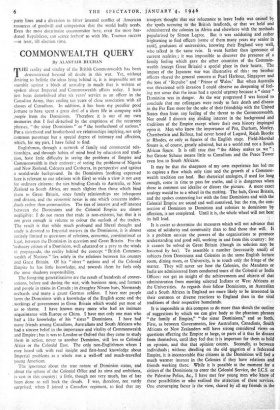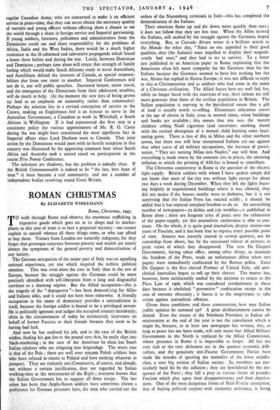COMMONWEALTH QUERY
By ALASTAIR BUCHAN
THE reality and vitality of the British Commonwealth has been demonstrated beyond all doubt, in this war. Yet, without .desiring to belittle the ideas lying behind it, it is impossible not to stumble against a block of unreality in much that is written or spoken about Imperial and Commonwealth affairs today. I have just been demobilised after six years' service as an officer in the Canadian Army, thus ending ten years of close association with all classes of Canadians. In addition, it has been my peculiar good fortune to have spent a great deal of a short life in company with people from the Dominions. Therefore it is out of my own memories that I feel disturbed by the emptiness of the recurrent phrases, " the sister Dominions " or " the brotherhood of nations." For a sisterhood and brotherhood are relationships implying, not only common parentage but a special degree of intimacy and affection, which, for my part, I have failed to find.
Englishmen, through a network of family and commercial rela- , tionships, and through habits of mind bred by education and tradi- tion, have little difficulty in seeing the problems of Empire and Commonwealth in their entirety ; of seeing the problems-of Nigeria and New Zealand, Calcutta and Canberra, in perspective and *against a world-wide background. In the Dominions (nothing expressed here is relevant to our relations with Eire) so wide a view is not easy for ordinary citizens : the ties binding Canada to Australia, or New Zealand to South Africa, are much slighter than those which bind them to Great Britain, since family relationships are infrequent .and distant, and the economic nexus is one.which concerns indivi- duals rather than communities. The ties of interest and self interest between the Dominions and the Colonial Empire are almost negligible: I do not mean that trade is non-existent, but that it is not great enough in volume to colour the outlook of the traders. The result is that while much profound and liberal thought and study is devoted to Imperial matters in the Dominions, it is almost entirely limited to questions of relations, economic, constitutional or lcgal, between the Dominion in question and Great Britain. For the 'ordinary citizen of a Dominion, well educated or a prey to the winds of propaganda, the reality behind the concept " British Common- wealth of Nations" lies solely in the relations between his country and Great Britain. Of his " sister " nations and of the Colonial Empire he has little knowledge, and towards them he feels only the most shadowy responsibility.
The foregoing generalisations are the result of hundreds of conver- sations, before and during the war, with business men, and fanners and people in trains in Canada ; in draughty Nissen huts, Normandy orchards and many a gaunt German schloss. I have met people from the Dominions with a knowledge of the English scene and the .workings of government in Great Britain which would put most of us to shame. I have known many more who had an intimate acquaintance with Europe or China. I have met only one man who had a like knowledge of his " sister-" Dominions. I have had many friends among Canadians, Australians and South' Africans who had a sincere belief in the importance and vitality of Commonwealth and Empire ; but it was to London or Oxford that they came to. study them in action, never to another Dominion; still less to Colonial Africa or the Colonial East. The only non-Englishmen whom I ever heard talk with real insight and firit-hand knowledge about Imperial problems as a whole was a well-off and much-travelled young American.
The ignorance about the true nature of Dominion status, and about the sphere of the Colonial Office and its aims and ambitions, is vast in this country : a little, though not very much, has of late been done to roll back the clouds. I was, therefore, not vastly surprised, when I joined a Canadian' regiment, to find that my
:troopers thought that our reluctance to leave India was caused by the spoils accruing to the British landlords, or that we held and administered the colonies in Africa and elsewhere with the methods popularised by Simon Legree. But it was saddening and rather frightening to find officers (some of them many years my senior in
rank), graduates of universities, knowing their England very well, who talked in the same vein. It went further than ignorance of current realities.; it was impossible to discover the presence of a family feeling which gave the other countries of the CommOn- wealth (except Great Britain) a special plaCe in their hearts. The impact of the Japanese war was illustratiVe of this: my brother officers shared the general concern at Pearl Harhour, Singapore and the loss of Repulse ' and -` Prince of Wales:. But when Australia was threatened with invasion I could observe no deepening of feel- ing nor sense that the issue had a special urgency because a " sister " Dominion was in danger. As the war progressed I was forced to conclude that my colleagues were ready to face death and disease in the Far. East more for the sake of their friendship with the United States than from any feeling of the threat to the Commonwealth. Nor could I discern any abiding interest in the background and traditions of the Empire except where their own history impinged upon it. Men who knew The importance of Pitt, Durham, Morley, Chamberlain and Balfour, had never heard of Lugard, Rajah Brooke or Rhodes, or only.. as figures of the English stage. Field-Marshal Smuts is, of course, greatly admired, but as a world and not a South African figure. It is still true .that " the Abbey makes us we " ; but Groote Schuur means little to Canadians and the Peace Tower even less to South Africans.
It may be that the sharpness of my own experience has led me to explore a flaw which only time and the growth of a Common- wealth tradition can heal. But rhetorical analogies, if used for long enough, come in time to pass for truths, and it is dangerous when those in common use idealise or distort the picture. A more exact analogy would be to a wheel in the making. The hub, Great Britain, and the spokes connecting her with the four Dominions and with the Colonial Empi-re are sound and well contrived, but the rim, the con• nection of- Dominion to Dominion and colonies to dominions by affection, is not completed. Until it is, the whole wheel will not bear its full load.
It is easier to determine the measures which will not advance that sense of solidarity and community than to find those that will. It is a problem outside the powers of the organisations to promote understanding and good will, working in and from this country: for it cannot be solved in Great Britain (though its solution may be hastened by her). To assemble a number (necessarily small) of subjects from Dominions and Colonies in the same English lecture room, dining room, or University, is to touch only the fringe of the matter. They will never see how the Colonies, the Mandates or India are administered from conducted tours of the Colonial or India Offices: nor get an insight of the achievements and objects of that administration from meeting selected Indians- or West Africans at the Universities. As regards their fellow Dominions, an Australian and a South African in England are more likely to be interested in their common or diverse reactions to England than in the vital traditions of their respective homelands.
Iris impossible in this compass to do more than sketch the outline of suggestions by which we can give body to the phantom phrases " the family of Empire," " the sister Dominions," and so forth. First, as between Governments, few Australians, Canadians, Smith Africans or New Zealanders will have strong considered' views on questions affecting the Empire at large, or parts of it that lie distant from themselves, until they feel that it is important for them to hold an opinion, and that that opinion • counts. Secondly, as between individuals ; without dwelling on the old qiiption of a federated Empire, it is incontestable 'that citizens in the Dominions will feel a much warmer interest in the Colonies it they have relations and friends working there. While it is possible at the moment for a citizen of the Dominions to enter the Colonial Service, the LC.S. or the Palestine Police, &c., I have met few young men who knew of these possibilities or who realised the attraction of these services. One encouraging factor is the view, shared by all my friends in the
regular Canadian Army; who are concerned to make it an efficient service in peace-time, that they can never obtain the necessary quality of recruits and young officers without offering them a chance to see the world through a share in foreign service and Imperial garrisoning. If young soldiers, foresters, policemen and administrators from the Dominions could see and share responsibility for the problems of Africa, India and the West Indies, there would be a much higher resistance to the ill-informed and subversive propaganda which found a home there before and during the war. Lastly, between Dominion and Dominion ; perhaps time alone will create that strength of family feeling which would make South Africans ready to assist Australians, and Australians defend the interests of Canada, as special responsi- bilities due from one sister to another. Imperial Conferences will not do it, nor will public speeches. Increased leisure, easier travel, and the emergence of the Dominions from their adolescent troubles, will do much to help. (At the moment the new joys of being grown up lead to an emphasis on nationality rather than community). Perhaps the solution lies in a revised conception of service to the Crown, making an Englishman feel it an honour to serve in the Australian Government, a Canadian to work in Whitehall, a- South African in Wellington. If it had represented the first step in a consistent policy the various appointments of Mr. R. G. Casey during the war might have constituted the most significant fact in Imperial affairs since Lord Durham went to Canada. That joint action by the Dominions would meet with no hostile reception in this country was illustrated by the approving comment here when South Africa and Australia took a united stand on participation in the recent Five Power Conference.
The solutions are shadowy, but the problem is nakedly clear. If the British Commonwealth is indeed to be " the last, best hope of man" •it must become a real community. and not a number of independent bodies revolving round Great Britain.
































 Previous page
Previous page